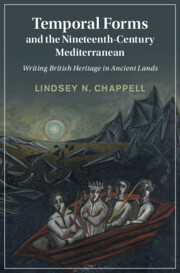Book contents
- Temporal Forms and the Nineteenth-Century Mediterranean
- Cambridge Studies in Nineteenth-Century Literature and Culture
- Temporal Forms and the Nineteenth-Century Mediterranean
- Copyright page
- Contents
- Figures
- Acknowledgments
- Introduction
- Part I “Civis Romanus Sum”
- Part II “We Are All Greeks”
- Part III “Kindred with the Mummy”
- Conclusion
- Notes
- Bibliography
- Index
- Cambridge Studies in Nineteenth-Century Literature and Culture
Part I - “Civis Romanus Sum”
A Global Imperial Model
Published online by Cambridge University Press: 09 November 2024
- Temporal Forms and the Nineteenth-Century Mediterranean
- Cambridge Studies in Nineteenth-Century Literature and Culture
- Temporal Forms and the Nineteenth-Century Mediterranean
- Copyright page
- Contents
- Figures
- Acknowledgments
- Introduction
- Part I “Civis Romanus Sum”
- Part II “We Are All Greeks”
- Part III “Kindred with the Mummy”
- Conclusion
- Notes
- Bibliography
- Index
- Cambridge Studies in Nineteenth-Century Literature and Culture
Summary
Part I centers Italy in British heritage discourse, showing how nineteenth-century writers used Italy (especially Pompeii, Rome, and Florence) to redefine their own historical and political identities. Amid political resurgence and ongoing unification efforts, the long tradition in British writing of depicting Italy as culturally and politically dead faltered. In response to the Risorgimento, British writers deployed fractal and syncretism – two temporal forms that afford nonlinear historicisms. Rather than the timelines that locate Italy in a distant past, fractal and syncretism connect past and present. One result is a redefined political liberty that can transcend national, gender, class, and race boundaries, as I explore through forgotten transnational figures including the writer Susan Horner and the abolitionist Sarah Parker Remond.
Keywords
- Type
- Chapter
- Information
- Temporal Forms and the Nineteenth-Century MediterraneanWriting British Heritage in Ancient Lands, pp. 25 - 100Publisher: Cambridge University PressPrint publication year: 2024

